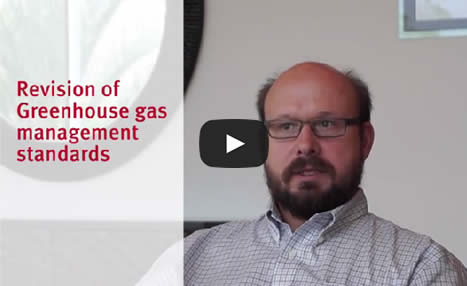First published in 2006, ISO's range of standards for greenhouse gases are an essential set of tools for programmes aimed at reducing greenhouse gas emissions, as well as for emissions trading. Now ISO's Technical Committee for greenhouse gas management, TC207/SC7, is reviewing several standards to ensure they meet the ever-changing market needs of the future.
ISO 14064-1 Greenhouse gases -- Part 1: Specification with guidance at the organization level for quantification and reporting of greenhouse gas emissions and removals will address some key GHG quantification issues and will include a more standardized reporting frame.
">ISO 14064-2 Greenhouse gases -- Part 2: Specification with guidance at the project level for quantifcation, monitoring and reporting of greenhouse gas emission reductions or removal enhancements will be expanded to be applicable to carbon credit and innovative technology projects, and projects internal to organizations.
ISO 14064-3 Greenhouse gases -- Part 3: Specification with guidance for the validation and verification of greenhouse gas assertions and 14065 Greenhouse gases: Requirements for greenhouse gas validation and verification bodies for use in accreditation or other forms of recognition are standards used by greenhouse gas programmes around the world and will be revised to ensure they are as up to date as possible and to serve new market needs such as product carbon footprint verifications.
ISO TC 207/SC7 regularly receives requests for new climate change standards. Hear more about the committee from its chair Tom Baumann in the video below.

The existing standards can be purchased from your national ISO member or from the ISO Store.
